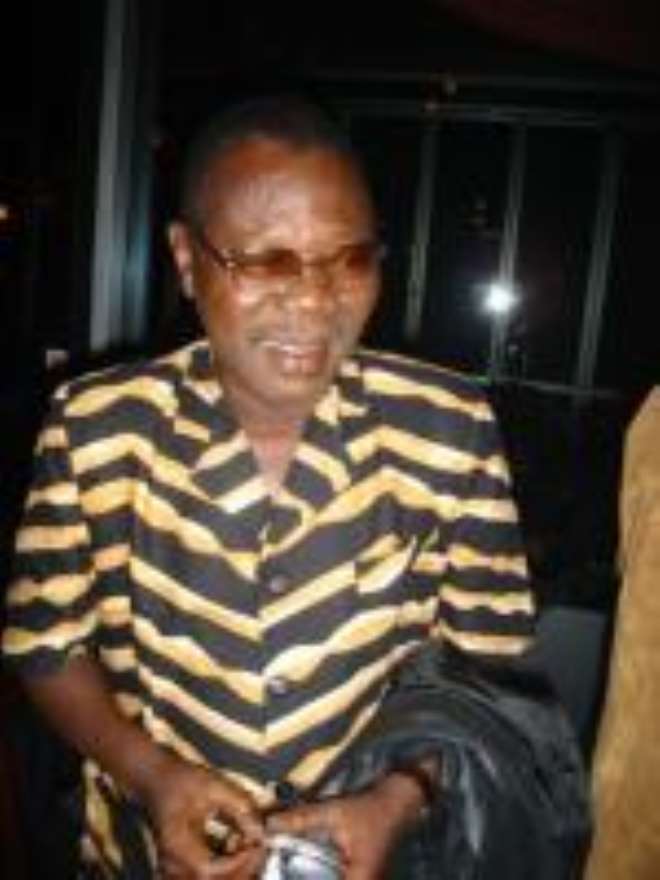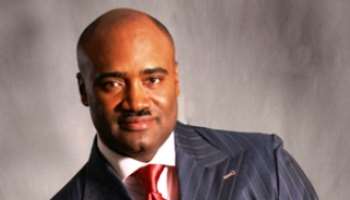COMEDIAN? NO, I’M A TOTAL ACTOR, SAYS SAM LOKO-EFE
Sam Loko-Efe, a prolific actor, writer and singer is a graduate of Theatre Arts from the University of Ibadan. The 66-year old man, who, during FESTAC was voted best actor in Langbodo, a play that was Nigeria's only drama entry which also won three awards in Thema 1996. 2006 saw him winning the Nollywood veteran of our time organised by NOFFEX, even as BOBTV has just conferred on him the award of best legendary professional for screen and stage artiste. The veteran actor who is also known for works like Piccadilly Circus, Sergeant Okoro and Ukwa, told Victor Akande in this humour-laden interview that his fulfilment does not lie in awards but on the number of actors and directors he has trained for the entertainment industry.
Congratulations on your awards
Thank you very much.
At this stage of your career, how do you feel about the award?
I feel that there is still a continuum. There are people who are still static; Monday is always Monday and Tuesday still looks like Monday to them but now, at this age we are beginning to see that Tuesday is quite different from Monday and should be more expanded than Monday. Same way that Wednesday should be more boisterous than Tuesday and so on and so forth. So, we thank God that we are still breathing and we are energizing daily. Forward ever, backward never.
Some people have the tendency to mistake you for a comedian. I like you to react to this.
I've told them several times, I'm a total performer. I never trained at the university as a comedian, I trained as an actor and I don't choose scripts, neither do I reject scripts that are good. So, if you give me a comic script, I would play it, give me a tragic one, I play it; give me a pseudo tragic one, I'll play it as well; and that is the meaning of a total performer. Now, if I have been boxed-in, which is what we call ham acting, in the comic world, it means I won't be able to play the role of a manager, neither would I be able to play the role of a reverend father. And I keep telling them; check all the awards that I've received; only one has been on comedy.
Look at the Piccadilly Circus, Langbodo and others, there is absolutely nothing like comedy in them. But the trouble with them is that there are people who feel slightly off loaded each time they watch comic films, so wherever they see Sam Owoh, or Sam Loko, they forget other films like Ojadike, My Love and so on and so forth. So, when they see me, their mind is tuned to what gives them instant pleasure. I know Nigerians don't like to watch films that are too serious because we think of our salary; whether it is coming at the end of the month or not; think about being sacked or not being sacked.
The next thing for them is to sit down and release tension and comedy film does help to achieve this. That is what is happening. I'm not a comedian; I'm an actor inside out, upside down.
As an African actor, is it correct to say that humour is part of our lives, as a result of which people seek it even in the most serious film or could it just be a psychological quest born out of a tension- soaked environment?
Drama, basically must have a conflict and resolution. The resolution may suit some people and may not suit some. If I'm not a full-time Christian and there is a clash between God and the gods; if at the end, God wins the gods, I won't be happy with it. The same goes for the Christians. So, it depends on how you look at it. Comedy is part of drama, so is tragedy.
You can have some tragic films that end with comedy but there are some that need no comic relief at all. But in the African settings we have Guerilla approach to things, such that where people are even telling serious stories, a drunk may stand up and contribute and people would laugh but what the drunk has just said may be more important than what the story teller had been saying. So, that's why our writers try to marry a little of comic relief into serious issues, it's not that it must be part of it.
As a veteran, I like you to look back at those days when you started and try to juxtapose it with today's Nollywood rave and tell us whether what we have is growthg or development?
From all indications, we are growing and developing at the same time. Don't mind some of our boys and girls who want to use big grammar to deceive us or who want to pretend to be militant by saying that we are not moving. Some are even too young to answer this type of question. Some of the stars actually entered this business about five or six years ago whereas some of us started about 48 years ago. For God sake, when you were earning N10 for a film compared to now when you are earning N300,000, for the same kind of film; are you not moving?
When you were buying your costumes all by yourself just to take part in a production and now that the producer would supply you with those things; are we not progressing? When in those days you lodged six to seven people in a room on location whether they were stars or not; and now, they even beg some stars to stay in a mini suit, are we not progressing? Those days when only one man would write a script and you dared not tamper with the fluidity of the script compared to now that everybody knows what is going on and people can say, no!
They may now tell a producer that this is not too strong, I have my name at stake too, let's do it this way and we hold a workshop and then we go on; with that kind of freedom, are we not progressing? Those days when Igbos would watch Igbo films and Yoruba would watch Yoruba films, and now that Africans and Europeans are watching Nigerian films, are we not moving forward?
They probably feel that we have the tendency to do better
Oh! They want us to move faster than sound which is going to be very difficult.
Even Europe and America, it took them several years to get to the level they are today. Indians, whom we were envious of in those days, the statement that took them about 40 years to make, we made it in less than 10 years here. But some of our die-hard critics, especially the subjective ones want to use a barometer by saying if we are in London… For God sake, we are not in London; this is Africa. Some doctors now want to become actors because they earn more if they make their mark; lawyers want to join us, engineers want to join us.
Even robbers who can't operate very well again because of inhibition from the police want to join us too. So, I want to be summoned to a debate for anybody to tell me that we are not moving forward. Let them bring that statistical data and we will compare notes.
I want you to be more pragmatic here by relating our own personal experiences, in those days, how really difficult was it for you?
There was nothing difficult. It is now that we are thinking that it was difficult. You see, we took the whole thing like a challenge. We were the ones begging to do it. We bought our costumes, props and contributed money to get vehicle to move us from Enugu to Abakiliki or to Onitsha, Benin, Warri and so on and so forth. At the end of the day, if for example, we might make only N200, which we used to share. Even up till the early 1980s; at the National Theatre, I would direct a play and maybe, get N50 or N100 or N200 as pay.
For directing a play?
For directing and taking part in the play at times. But when the explosion came, everything went up. So, compared to these days, it was a challenge; and if you wanted to scale them, it was more difficult then than now. Also, only a few people were genuinely interested in the profession by then. The situation is more difficult now because there are many people, and you can't have two lead characters in a play. Where there are two leads, one would be sub-lead. Now, there is competition for space.
It is more difficult now because there are so many young boys and girls who can interpret correctly; there are so many elders who speak English effortlessly and interpret effortlessly, and when we say that an actor today earns N500,000, what that would buy is probably what N200 would have bought in those days. So, it is still the same movement where by a monkey is given different names.
How would you react to the fate of some of veteran artistes who had died uncelebrated when juxtaposed with the fact that you are a fulfilled man by virtue of your recognition?
You see, left to me, there are certain things that are of the earth. My idea of fulfilment is not whether I am given the title of OON or GCON, no! If I have done a job properly and I feel satisfied that I have done one or two things, I am fulfilled. Like I was telling some people earlier, my computer systems are slightly different.
If you ask me now what are my achievements in the film industry, I won't tell you how many cars I have, I have many cars actually, I'm not going to tell you the number of buildings I have, because I put them here and there because I'm a roving ambassador. Rather I'll tell you how many actors I've trained, how many I still intend to train, how man y directors and actors I've produced. So, that's my own idea of fulfillment.
If they died unsung, maybe we, the living ones are the ones seeing it so, because I have not died yet, so I won't know. Maybe when I die, they will sing I don't know. If they don't sing, I won't mind but I must have fulfilled a mission. I have impacted knowledge.
Yet, we say it is no longer arts for arts' sake…
Yes! But I expect that we should be talking about how to b ring the corporate organisations into the scheme of things. Let's say for example, UBA award for best actor of the year N3 million, First Bank's award for the best choreographer, N2 million, Guarantee Trust Bank's award for the best veteran, N6 million, and so on.
This is nothing to them, it is corporate leverage. But our people have not gone there, you don't expect Amaka Igwe or Afolabi Adesanya of Film Corporation to go and steal money and give you? No! Dunlop has enough reserve, Michelin is there, Cadbury is there, NBL is there, Guiness is there, MTN Celtel, Glo and others, are there.
Do you know how much they make in a day? Let them do something so that when the actor lives, he has about N2 million and he can then invest. Then, others would now sit up and you won't know that unconsciously, you are creating a training channel. That is what I am talking about.
Thank you very much Mr. Sam Loko but before you leave, give us the benefit of knowing about your background.
Sam Loko, Aae Efewonkeke, the only son of the Arase Efewonkeke family, a very modest, poor family, son of a popular Akara (bean cake) seller in Abakali province in those days. The son of a warder who died too early, a boy who learnt how to be self sustainable from youth, paid his way through the university, who was also paying for his children while he was still schooling too, now an actor, director, singer, choreographer; almost a total actor. His mission is go there and conquer.
But don't go and conquer alone, have a team, drive apostles. I am looking for at least one thousand apostles in each department of artistry and these young ones are the ones who will come and do the job when I sit down as mere spectator of events. I wish them the very best.
How old is Sam Loko?
Six-six… 66 and that could just be on paper (laughter...)
Latest News
-
 "I'll Keep Expressing My Art From My Heart" - Kam
"I'll Keep Expressing My Art From My Heart" - Kam -
 Mr Macaroni Completes Advanced Acting For Camera C
Mr Macaroni Completes Advanced Acting For Camera C -
 "We're Not Just Celebrating The Past, We're Creati
"We're Not Just Celebrating The Past, We're Creati -
 "Men Should Not Engage In Blowjob Either In Form O
"Men Should Not Engage In Blowjob Either In Form O -
 "I Was Sneaking Out To Parties To Listen To Music
"I Was Sneaking Out To Parties To Listen To Music -
 "Nigerian Parents Prefer Professional Courses To M
"Nigerian Parents Prefer Professional Courses To M -
 "Why I Married Late" - Veteran Actor Saka Reveals
"Why I Married Late" - Veteran Actor Saka Reveals -
 "My Husband Is Not A Secret" - Ruth Kadiri Addres
"My Husband Is Not A Secret" - Ruth Kadiri Addres -
 "Be Intentional, Hardworking, And Be Consistent I
"Be Intentional, Hardworking, And Be Consistent I -
 "Stop Comparison, Focus On Your Own Goal" - Funke
"Stop Comparison, Focus On Your Own Goal" - Funke














